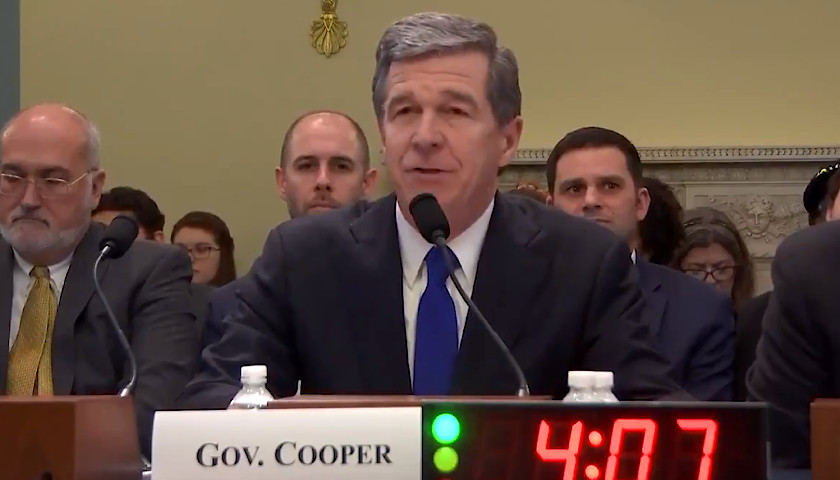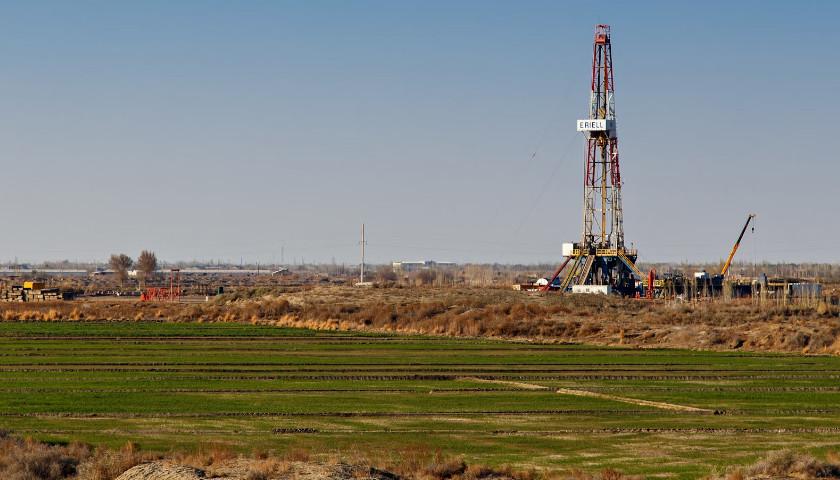North Carolina Democratic Governor Roy Cooper went to Washington, D.C. this week to testify before a House Committee on Natural Resources about the impact of ‘Climate Change’.
The carbon footprint of an economy class direct, roundtrip flight from Raleigh-Durham to Dulles airport is approximately 0.10 metric tons.
Cooper’s testimony included pushing for reducing greenhouse gases and remarks in reference to natural disasters in North Carolina such as mudslides and hurricanes.
Scientists have found that climate change makes weather more erratic. It makes storms larger and more powerful and it intensifies heavy rainfalls and droughts. We've seen it here in North Carolina. The time to address climate change is now. pic.twitter.com/MvRzlz3kCZ
— Governor Roy Cooper (@NC_Governor) February 7, 2019
This is not Governor Cooper’s first foray into Climate Change.
On October 29 of 2018, Cooper issued Executive Order 80 for the purpose of addressing climate change and to “transition” North Carolina to a “clean energy economy.”
Cooper’s order calls for a 40 percent reduction in greenhouse gas emissions by 2025 and for at least 80,000 zero-emission vehicles in the state.
Just 12 days prior to Cooper’s Executive Order, the Environmental Protection Agency announced that U.S. greenhouse gas emissions had dropped by 2.7 percent from 2016 to 2017.
In his testimony before the House Committee on Natural Resources, Cooper pointed to a Department of Defense report that he said is proof that two military installations are at risk due to climate change.
The Department of Defense report does mention Fort Bragg and Sunny Point Ocean Terminal, but in a chart in the appendix listing various natural disaster risk potential.
In his remarks to the committee, Cooper highlighted the amount of money spent to get relief efforts going and that the effort was bipartisan.
“I’ve worked together with members of the North Carolina General
Assembly to appropriate state relief, including $65 million to help our state draw down federal disaster recovery dollars and $200 million to fund the North Carolina Farmer Recovery Reinvestment Program,” said Cooper.
“We’re also making a difference together,” Cooper said. “I’m pleased that members of our congressional delegation and federal agencies are helping provide meaningful relief to North Carolinians hit hard by the storm.”
Governor Cooper stated that more than $1 billion in state and federal recovery resources had been allocated and gave a list of sources that included FEMA and the National Flood Recovery program.
Absent from Cooper’s list is the $793 million the North Carolina General Assembly has purposed for dealing with Hurricane Florence.
While testifying before the committee, Cooper also made reference to the “U.S. Climate Alliance,” who he described in his remarks as “a bipartisan group of 20 governors committed to uphold the goals of the Paris Agreement on climate change, including by collectively achieving our share of the U.S. emission reduction target.”
The Governor announced he had joined the U.S. Climate Alliance in 2017, tweeting that “NC is committed to upholding the Paris Agreement, that’s why Gov. Cooper joined 14 states in the US Climate Alliance.”
Over the last year, the Cooper administration has come under fire for the lack of action with regards to Hurricane Matthew recover efforts.
The Cooper administration first came under fire for what appeared to be an attempt to alter project bid documents by creating a paper trail with an appearance that more than one vendor had been considered.
After months of revised proposal requests and meetings, a vendor was finally picked. The company chosen was IEM, whose CEO gave Roy Cooper’s gubernatorial campaign the maximum donation of $5,100 in 2016. The company’s CEO also has a history of making donations to elected officials in states where her company does business or might be engaged in a bidding process.
The failings of the Cooper administration’s Hurricane Matthew efforts even caught the attention of the New York Times, who noted that North Carolina was a ‘slow spender’ when it came to the federal funds allotted for Matthew’s victims.
“As of Sept. 1, the state had spent just $2 million of $236.5 million of a federal Community Development Block Grant program. The state’s heels-in-tar pace earned North Carolina a spot on the list of “slow spenders” compiled by the housing department.”
Just a month shy of two years after Hurricane Matthew hit the state, media outlets reported that zero recovery projects had been completed. Governor Cooper was pressed for answers but kept repeating that help ‘had to come faster’ and couldn’t share any sort of timeline for relief efforts to reach the victims.
– – –
A.P. Dillon is the North Carolina Bureau Chief for The Tennesee Star and a reporter at Battleground State News. Follow A.P. Dillon on Twitter. Email Tips to [email protected].
Photo “Roy Cooper” by Roy Cooper.








